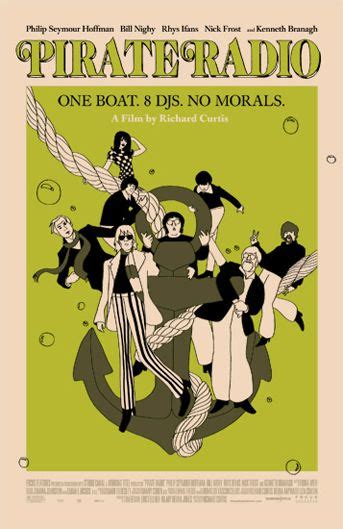Pirate Radio
directed by: Richard Curtis, year: 2009
actors: Philip Seymour Hoffman, Bill Nighy, Nick Frost, Rhys Ifans, Tom Sturridge
actors: Philip Seymour Hoffman, Bill Nighy, Nick Frost, Rhys Ifans, Tom Sturridge

Description:
Pirate Radio, also known as The Boat That Rocked, is a comedy film that takes audiences back to the 1960s, focusing on a group of rogue DJs who operate a pirate radio station broadcasting rock and pop music to the United Kingdom from a ship anchored in the North Sea. Defying the British government's lack of enthusiasm for rock music, these rebellious DJs capture the spirit of freedom and rebellion, bringing the vibrant sounds of the era to millions of listeners while facing governmental opposition.Keywords:
Comedy, Drama, Music, 1960s, RadioDo pirate radio stations still exist?
Yes, pirate radio stations still exist today, though they operate illegally and often face legal challenges. These unlicensed stations typically broadcast without government authorization, often to provide alternative music, news, or content that may not be available through mainstream channels. While advancements in digital streaming and online platforms have made it easier for independent voices to reach audiences, some continue to choose the pirate radio route for its rebellious spirit and community-focused approach.
Is a pirate radio station illegal?
Yes, a pirate radio station is illegal in most countries, including the UK, where "Pirate Radio" is set. These stations operate without the necessary licenses from regulatory authorities, typically broadcasting on FM or AM frequencies. They often aim to provide content that mainstream broadcasters may not offer, such as niche music genres or alternative viewpoints. While they can be popular and influential, operating without a license can lead to fines and confiscation of equipment.
Is the movie pirate radio a true story?
"Pirate Radio," also known as "The Boat That Rocked" in some regions, is a fictional comedy inspired by real events. It is set in the 1960s and revolves around a pirate radio station broadcasting from a ship in the North Sea, reflecting the era's underground music scene. While the film's characters and specific storylines are not based on actual individuals or events, it draws inspiration from real pirate radio stations like Radio Caroline, which operated outside British regulations to provide rock music to listeners.
Why did they change the name of the movie pirate radio?
The movie "Pirate Radio," originally titled "The Boat That Rocked," was renamed for its North American release to emphasize its focus on the illegal pirate radio stations in the 1960s. The new title better conveyed the film's theme of music, rebellion, and the cultural impact of these stations, which played a significant role in broadcasting rock and pop music during a time when it faced heavy censorship. The change aimed to attract a broader audience familiar with the concept of pirate radio.
Explore More Categories:
Monarchy Piracy Supernatural Thriller Self Sufficiency Allegory Tribal Cosmic Battle Post Impressionism Prequel Adrenaline Family Disapproval Sustainability Oppenheimer Negotiation Outsider Political Intrigue Transgender Ghosts Boxing Drama Misunderstanding 1920s Resource Scarcity Character Driven Observational